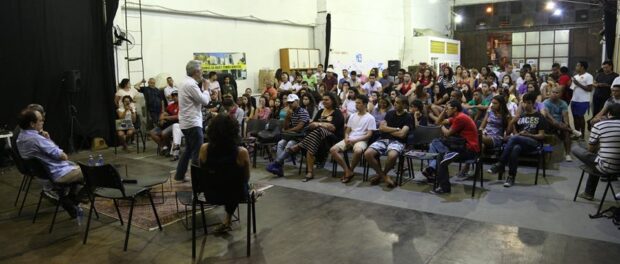
On Thursday, September 15, three mayoral candidates attended a public debate hosted in Complexo da Maré in Rio’s North Zone. The debate was organized by A Maré que Queremos (The Maré That We Want), a collective of community leaders representing the 16 favelas that constitute Maré. While all 11 mayoral candidates were invited to participate, on Thursday evening three were present: Carlos Osório from the Brazilian Social Democracy Party (PSDB), Alessandro Molon from the Sustainability Network (REDE), and Edson Santos, running mate to Jandira Feghali of the Brazil’s Community Party (PCdoB). Roughly 125 Maré residents gathered at the Centro de Artes da Maré for the debate, the first event of its kind this election season.
Each candidate was given five minutes to introduce his proposal as mayor for the city. Residents in attendance then had the chance to directly ask them about their positions. Both the candidates’ introductions and the discussion that followed focused specifically on community concerns, including issues of health, education, transport, and the Olympic legacy.
Molon emphasized changing the relationship between the city government and communities like Maré in order to create opportunities for residents. He said that transparency is a key part of his platform because “transparency is the best remedy against corruption.”
Osório’s discourse centered around expansion of health services as a means to integrate Maré. In regards to the legacy of the 2016 Olympic Games, he said that his administration would look to open the sports facilities to schools and communities for more public use.
Santos noted the trend of investment in the South Zone and Barra da Tijuca while areas like Maré remain underdeveloped. Housing, schools, and infrastructure are the areas in which Santos said he would encourage investment.
As the event concluded at around 9pm, a representative of A Maré que Queremos read aloud a list of community objectives, which the candidates then signed as a pledge. These 12 demands centered around infrastructure, including participatory planning practices, the creation of collaborative spaces, and sustainable development.

